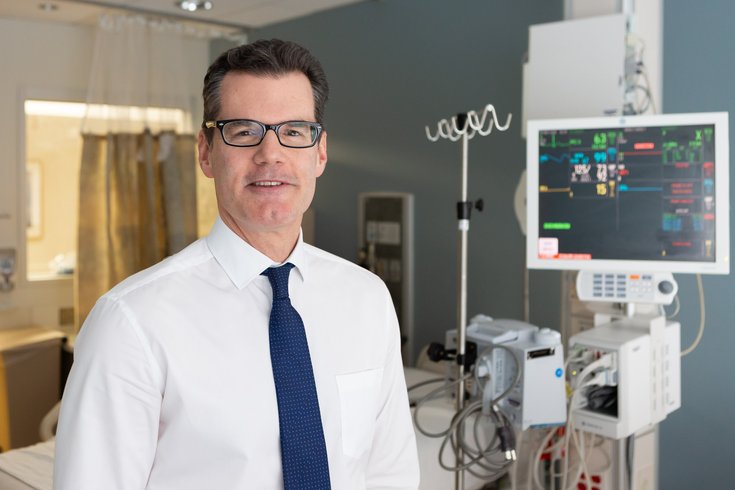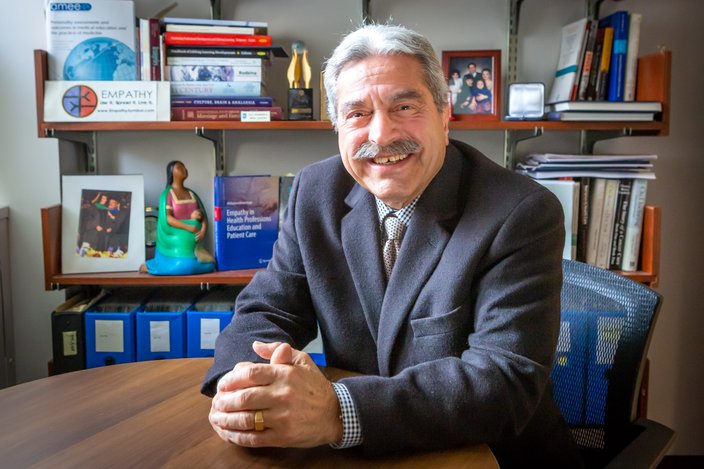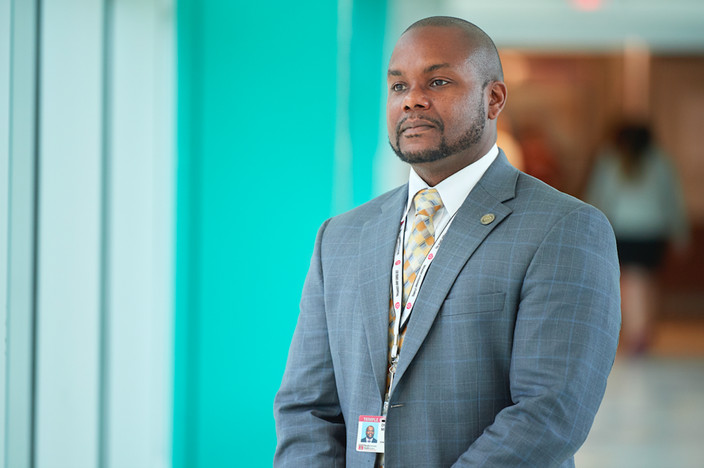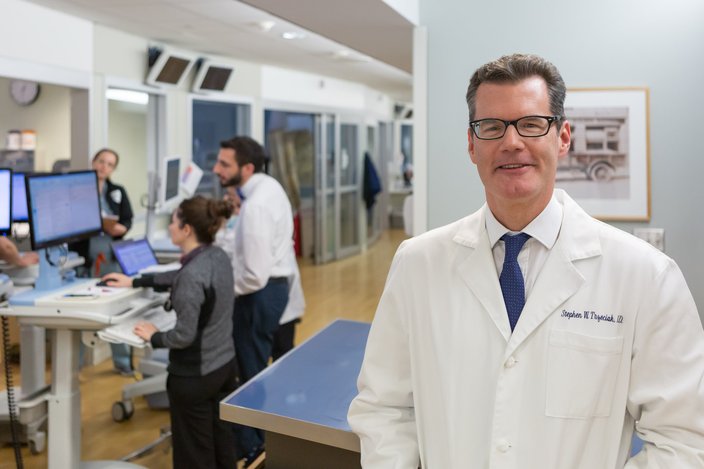
December 10, 2018
 Thom Carroll/PhillyVoice
Thom Carroll/PhillyVoice
Dr. Stephen Trzeciak, head of Cooper University Health Care's critical care department, is a proponent of compassionate care, citing research that shows it improves patient outcomes, decreases health care costs and reduces physician burnout.
Dr. Stephen Trzeciak did not always believe that compassion makes a difference in health care – even if that seemed like the idealistic viewpoint to hold.
Then he took a look at the data. Trzeciak – an intensivist who heads Cooper University Health Care's critical care unit – not only became a believer, but an ardent advocate.
"Does it really matter?" Trzeciak said. "I would hope that most people in health care would answer the question, 'Well, of course it matters, because we have both a moral obligation and an ethical obligation.' We ought to be compassionate."
Yet, nearly 50 percent of American patients do not believe that health care professionals provide "compassionate care," according to the Schwartz Center for Compassionate Healthcare in Boston. And 56 percent of physicians say they do not have time to show compassion to their patients, according to a study published by the Journal of General Internal Medicine.
That amounts to a compassion crisis in health care, Trzeciak said. And it comes despite research suggesting that compassion can improve patient outcomes and decrease health care costs. It even helps the physician practicing compassion, by reducing physician burnout.
Trzeciak, who bills himself as a research nerd, has written a book on the subject, set to be published in March. He has given TED talks on the topic. And he's in the process of validating a set of compassion-related questions to be added to patient experience surveys.
It's all part of a data-driven pursuit to infuse health care with more compassion by showing sympathy and concern for the sufferings of others.
"We believe the more rigorous and data-driven we are, the more obvious the need to change behaviors," Trzeciak said. "That's one important aspect, that change can happen. Once you see that it makes a difference, that compassion matters, change is possible."
Trzeciak may be a relatively new convert to "compassionomics," as he calls it. But he's far from the only believer.
Dr. Mohammadreza Hojat, a research professor at Thomas Jefferson University, developed the Jefferson Scale of Empathy, a validated test that measures the empathy of physicians.
Dr. Mohammadreza Hojat has been studying the effects that empathy – sometimes used interchangeably with compassion, though Trzeciak maintains empathy sparks compassion – has on health care for several decades at Thomas Jefferson University.
Hojat developed the Jefferson Scale of Empathy, a validated scale that measures empathy in health care providers and medical students. To do so, providers and students are asked to respond to 20 statements, rating their level of agreement.
The scale – which has been translated into 56 languages and used in at least 85 countries – formed the basis for much of Hojat's research into empathy.
"At the time that (medical_ students need more empathic understanding, (they are) losing that empathic feeling and understanding – starting from the third year of medical school." – Dr. Mohammadreza Hojat, Thomas Jefferson University
"We have reported empirical evidence," said Hojat, a research professor and licensed psychologist. "It's not just anecdotal reports. It's not just opinion. We have done large-scale studies on empathy and patient outcomes."
In one study, Hojat found that diabetes patients are more likely to have their disease under control if their physician scores high on the Jefferson Scale of Empathy. Similarly, another Hojat-led study found a physician's score correlated inversely with diabetes patients' likelihood to develop acute metabolic complications.
Other researchers have published similar findings. For instance, surgical patients heal faster and are discharged from the hospital faster when they are encouraged by their anesthesiologists during the immediate post-operative period.
But why does empathy make such a difference?
Physician empathy involves understanding the patient's perspective, an aspect that research shows boosts patient empowerment and enhances their perception of being helped.
Hojat suggested in one study that empathy enhances trust between the physician and patient, promoting greater compliance from the patient. That, in turn, produces more accurate diagnoses and improves patient adherence.
With data showing that compassion betters patient outcomes, focus must be given to the way physicians are trained. And it prompts another question – can their empathy levels be improved?
Hojat found a perplexing answer when studying medical students.
Their empathy levels fall sharply when they reach their third year, Hojat found. That timing proves troubling, as it comes when their curriculum shifts from the classroom to rotations in hospitals and clinics.
Suddenly, the idealism the students carried into medical school is tested by demanding patients, hospital guidelines and insurance regulations, and other health care realities.
"At the time that the students need more empathic understanding," Hojat said, "(They are) losing that empathic feeling and understanding – starting from the third year of medical school."
"If we had the power to go back 100 years and look at the state of medicine, then we would see that many of the things that we're focused on now were fundamentals. You couldn't practice medicine without them." – Dwight McBee, Temple University Health System
Hojat found those empathy levels can be improved – but there is a catch. To sustain the gains, regular reinforcement is necessary. That means one medical school class aimed at boosting empathy will not suffice.
His research demonstrates why.
In one study, a group of students watched and discussed video clips designed to enhance their empathic understanding. Afterward, the students' average empathy scores increased.
Ten weeks later, the group was split in two. One portion watched a lecture on empathy in patient care. The other watched a movie about racism. The first group sustained its empathy score; the second saw its reduced.
"The moral of the story is that first of all, empathy declines," Hojat said. "Second, it is possible to improve. Thirdly, in order to sustain this improvement, you have to reinforce it more."
It's all part of the so-called "Art of Medicine," essentially the soft skills needed to deliver effective patient care. But American medical schools are leaving students ill-equipped in these areas, Hojat said.
"In our medical education system, we are very proud and happy that we are No. 1 in teaching our students the Science of Medicine," Hojat said. "But we cannot claim the same thing for teaching our students the Art of Medicine."
It's simply not enough to declare the importance of empathy in health care, Hojat said. Medical schools need to make profound structural changes designed to enhance and sustain it.
"On the surface of it, everyone says this is a great idea," Hojat said. "But it should not die at that stage."
Dwight McBee, Temple Health's chief experience officer, is overseeing a new initiative designed to enhance compassion, teamwork and communication among Temple Health's 10,000 employees.
When Dwight McBee joined Temple University Health System in January 2017, he stepped into a newly-created role tasked with developing a more welcoming environment and boosting patient satisfaction.
Under McBee's leadership, Temple is implementing a new initiative designed to enhance compassion, teamwork and communication among its 10,000 employees – and the patients they see.
The initiative, dubbed CiCARE, establishes a set of core behavioral guidelines for everyone from surgeons to schedulers. It is borrowed from Stanford Medicine, which 10 years ago founded the country's first Center for Compassion and Altruism Research and Education.
"It's really all about managing our first impression with patients or with each other," said McBee, Temple Health's chief experience officer. "We talk about being very meaningful with connecting with people."
That goes beyond making eye contact and smiling, McBee said. It involves clinicians facing the patient during visits – not continuously staring at electronic records. And it includes being mindful of the positive or negative connotations that various phrases carry.
"When rigorously measured, it takes about 40 seconds to give a meaningful expression of compassion to a patient. It's hard for the argument that I don't have time for compassion ... to hold up." – Dr. Stephen Trzeciak, Cooper University Health Care
"When we respond to people, we really want to be thoughtful about that," said McBee, who holds MBA and nursing degrees. "When someone says, 'Thank you,' using 'my pleasure,' rather than 'no problem' is absolutely part of what we do."
After all, patients are more than twice as likely to listen to their physician when that doctor is a good communicator. And patients are more likely to reveal important information to their clinicians when they are compassionate, leading to more accurate diagnoses.
"If we had the power to go back 100 years and look at the state of medicine, then we would see that many of the things that we're focused on now were fundamentals," McBee said. "You couldn't practice medicine without them. Some of the simple aspects of health care encounters have gone by the wayside."
Under Temple's new initiative, McBee said providers are urged to pay attention to "the smallest little details," like sitting at a patient's bedside, and encouraged to search for opportunities to show compassion.
In one case, McBee said a staff member gave his own shoes to an assault victim who had come into Temple University Hospital with clothes on his back, but no shoes on his feet. Another provider – with hospital approval – paid for a recently-paralyzed patient to get a desired haircut.
"It's a process, because we're really changing culture," McBee said. "Health care has become very medical-centric because of the complexities. We create systems and processes that really cater toward the workforce, which is important.
"I think kindness is really all about becoming patient-centric and shifting the way we create processes in a way that is more kind to our patients and takes patient preferences into account," he added.
Dr. Stephen Trzeciak, head of Cooper University Health Care's critical care department, says he initially doubted the impact compassion could have in health care. Then he took a look at the data.
Some two-thirds of Americans have gone through a meaningful health care experience without receiving compassion, according to national survey conducted by California-based Dignity Health.
Trzeciak highlighted this in one of his TED talks, citing a 2007 head-on collision between two buses that killed six people in Sweden. Five years later, researchers interviewed nearly all of the 56 survivors. Among the survivors' most distinct memories – a lack of compassion from the caregivers at the hospitals.
A devastating bus crash represents an atypical experience for most people. But Americans log thousands of health care visits each day, seeking treatment for all kinds of health-related issues. And physicians miss about 60 percent of opportunities to show compassion, according to a study published by the Journal of the American Medical Association.
"A patient may make some sort of expression that they're in a tough time with their illness, or there are other things in their life that are challenging them," Trzeciak said. "Physicians can either stop and acknowledge that and ask about it, or offer words of support and encouragement. Or they can blow right throw it and go on to the next question."
Still, health care economics demand efficiency, Trzeciak said. Many physicians simply do not believe they have time for compassion, seeing it as an inconsequential nicety.
"It begs the question, how much time does it actually take?" Trzeciak said.
The answer is less than a minute, according to a 1999 Johns Hopkins study that examined the effect compassion has on cancer patients. When physicians spent a brief moment reiterating a supportive message – that they were making this journey together – patients had less anxiety.
"When rigorously measured, it takes about 40 seconds to give a meaningful expression of compassion to a patient," Trzeciak said. "It's hard for the argument that I don't have time for compassion ... to hold up. So that's probably not true."
Plus, researchers at the University of California-Davis found patient-centered care lowers annual health care costs and decreases the use of health care services. Patients receive fewer diagnostic tests, specialist referrals and unnecessary hospitalizations – reducing their annual payments.
Compassion also may protect health care providers from burnout, a condition experienced by more than half of all providers, according to some studies. Additional research shows that compassionate professionals experience greater resilience and higher levels of well-being – potentially counteracting burnout.
Trzeciak once felt burned out himself, having spent nearly two decades working in the intensive care unit. But he declined to detach from his work, believing the antidote must be at the point of care.
Instead, he began testing the 40-second finding himself. Anecdotally, he found himself connecting better with his patients and caring more. It's partly why he became a believer in compassionomics.
"I'll be honest with you, I didn't always believe that," Trzeciak said. "I figured people are either born compassionate or they're not."
Now, having dug through all sorts of scientific research, Trzeciak holds a different viewpoint. Practitioners may enter health care with different levels of compassion. But all can gain.
Trzeciak compared it to throwing a javelin. Some people can naturally throw it farther than others. But with enough diligence, everyone can throw it farther and farther.
Showing compassion is no different, he said.
"It's really just like anything else in health care," Trzeciak said. "You need to be intentional. It needs to matter. And then you need to practice."
Follow John & PhillyVoice on Twitter: @WriterJohnKopp | @thePhillyVoice
Like us on Facebook: PhillyVoice
Add John's RSS feed to your feed reader
Have a news tip? Let us know.
 Thom Carroll/PhillyVoice
Thom Carroll/PhillyVoice Courtesy of/Temple University Health System
Courtesy of/Temple University Health System Thom Carroll/PhillyVoice
Thom Carroll/PhillyVoice